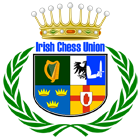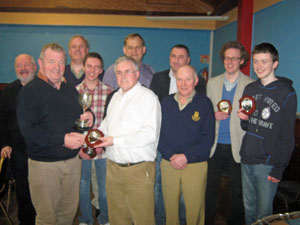John Bradley is an archaeologist who works in the Department of History at NUI Maynooth. He has been a member of Kilkenny Chess Club since 1971.
Kytelers Inn 1969
The present Kilkenny Chess Club was established at Kyteler's Inn on Monday 3 February 1969. It was the third in what might be called a discontinuous continuity. The first Kilkenny Chess Club was formed in the 1830s and was associated with Captain Evans (he of the Evans Gambit) and his pupil Sir John Blunden (1814-90) of Castle Blunden, just outside the city. Blunden's work as a barrister took him to London where he played Staunton on several occasions, as well as Anderssen and Paulsen in exhibition games.
The soil of Kilkenny also gave birth to James Mason (1849-1905) although it cannot be said to have nurtured him. Mason learnt chess in New York but remained proud of his ancestry as is clear from an interview he gave to the Irish Times in 1888. There are references to Kilkenny players in almost every decade after 1870 but whether a club existed or not is unclear. The second club was established in 1955 by A.C. (Gus) Murray, a tax inspector, and Leo McAdams (1907-79), the manager of the largest store in Kilkenny, The Monster House. Meetings were held in the CYMS Hall, William St.. The club did not participate in the Leinster leagues, which were confined to Dublin clubs at this time but it seems to have played a role in hosting the Inter-Provincial chess championship between Leinster and Munster on 26 November 1956, the first time that the two sides had met since 1939. On board six for the Munster players was a person who was subsequently to transform chess in Kilkenny, Liam Brady.
Derek Porteus, the Social Sparkle!
The guiding spirit behind the foundation of the present club was Derek Porteus (d.2004). Born in England, Derek had grown up in Cork and it was his work as a commercial traveller for Guys Paper Works of Cork that brought him to Kilkenny. Naturally gregarious and genial, with a sparkle in his eye and a kind word for everyone, Derek was a master of social situations. Tall and slim, he had a physical elegance and it was no surprise to learn that he had won medals for ballroom dancing. Those who gathered at the first meeting were Donal Fennelly, an engineer at Smithwick's Brewery, Paddy Kelly, a solicitor, Eddie McDermott, an insurance broker from Gowran, Jim McHardy, manager of St Joseph's Laundry, Des O'Carroll, a High Street businessman, Pat O'Shea, a manager at Avonmore Foods, and Paddy Raggett, a builder. Within a week or two others joined: Michael Buggy, a solicitor, Michael Langton, a political activist, Seamus Mahony, who worked for CIE, Tomás Ó Murchú, a schoolteacher, Joe Walsh, a publican, and three women, Betty Delahunty, a retired schoolteacher, Tess Gowan and Mrs O'Callaghan, both housewives. By May 1969 there were sufficient regulars to engage in a tournament. In the normal interpretation of things, the standard of play was poor. King's Gambits and Giuoco Pianos predominated. But ... the players were united by their love of the game.
From Liam Brady to Magnus Carlsen!
Liam Brady (1936-2013) was to be the guiding light that fostered this amateur club and brought it from its small beginnings to a place where it performed on the world stage and where, in our match against Oslo (2007), Magnus Carlsen watched and commented on our play. A chartered accountant, Liam, a native of Cork, came to Kilkenny in 1970. He was Cork champion on three occasions and played top board for Munster in 1965, ahead of the former Irish champion E.N. Mulcahy. Liam was Munster champion in 1966 and subsequently, he played for Dublin Chess Club's Armstrong team.
Liam Brady introduced a new standard of play to Kilkenny. He arranged friendly matches with neighbouring clubs, including Carlow, Wexford and Cork CYMS but his major achievement was to bring Kilkenny into the Leinster Chess Leagues. In 1971 Kilkenny entered the O'Hanlon Cup, then divided into an A and a B group, each of twelve teams. Kilkenny won its section but although it lost out in the play-off to Kevin Barry, it qualified to move on to the Ennis Shield. In 1975 the team progressed into the Heidenfeld and in 1979 into the Armstrong Cup.
Jack Lowry & Boris Spassky!
A significant addition to the team occurred in 1972 when Jack Lowry began to play for the club. His business skills and imagination were to transform Irish chess. The Kilkenny Chess Tournament, established in 1977 to give Kilkenny players a bit of practice before the leagues commenced, has become a premier tournament. Jack brought Boris Spassky to Ireland in 1991, rejuvenating Irish chess and providing the inspiration for the Masters tournament at Kilkenny.
Camaraderie
From the beginning the club had a strong social side. In the fashion of the times dinner dances were held to include husbands, wives, friends, partners and members of the family. It is continued today as an annual dinner. Away-games helped to strengthen the social connection. Most games were in Dublin, then a two-hour drive (unless you were travelling with Jack Lowry!). Games lasted four and a half hours. So before returning home it was necessary to have dinner. The dinners began with the usual banter about who had won and who had lost but expanded, in the way of Irish conversation, to include all aspects of life. The camaraderie created an esprit-de-corps that made the team much stronger than its ratings suggested.
Significant new members in the later 1970s included Maurice Buckley and Alan Dooley, both bank officials, and Fergal O'Dwyer and Finnian Curran, both students. Maurice and Alan are probably best known to Irish players for their contribution to the Kilkenny Tournament. Maurice also used his influence to persuade the Bank of Ireland to sponsor Junior Chess by providing chess sets and boards to Irish schools, a development that resulted in a huge expansion in Irish chess. Membership of the club was largely focussed on the city and its environs but Jim Delaney, a garage owner, from Clough in north Kilkenny and Tom McGrath, from Ballingarry, County Tipperary, both made important contributions to the club, as did Liam Delaney from Thurles. In the late 1980s and 1990s, the Lowry twins, Darragh and Paul, proved to be formidable opponents.
The Struggle
By 1990 Kilkenny was able to field three teams in the Leinster leagues but the top team found that survival in the Armstrong was hard going. It consisted largely of the same team that had entered the O'Hanlon Cup in 1971. In truth, it was an excellent Heidenfeld team and would progress into the Armstrong only to be relegated the following year. On one occasion the trauma was such that after the team was sent down from the Armstrong, it crashed through the Heidenfeld into the Ennis Shield, which we won, and gradually made a comeback.
With the demise of the Dublin club Collegians, Kilkenny gained the membership of the former Irish champion Eamon Keogh and, as a result of the collapse of the former Yugoslavia, a Croatian Serb, seeking refuge, Darko Polimac. Darko was a qualified vet but was not permitted to work in Ireland so he devoted his time to teaching chess in schools. His results were remarkable and fostered the development (among others) of Karl McPhillips, Ryan Rhys Griffiths and John Courtney.
About the year 2000, through the persuasive skills of Jack Lowry, GM Alexander Baburin, IM Mark Quinn and IM Mark Heidenfeld began to play for Kilkenny. Their presence improved the quality of play (and the results) enormously yet the Armstrong Cup remained elusive. It is an extremely difficult competition to win requiring not just ability and commitment but also luck. Kilkenny were runners-up on five occasions, sometimes by half-a-point but eventually won the trophy in 2011.
The Future of Kilkenny Chess Club
As to the future, the age profile of the membership is not the best, weighted as it is to the under-20s and over-60s. The number of teams is two. Kilkenny, like others, has lost players to emigration and students to University clubs. Yet so long as Kilkenny can produce players of the calibre of Karl McPhillips, John Courtney, Eoin Minnock (all club champions) and Ryan Rhys Griffiths, it has a future.
Siegbert Tarrasch famously commented that 'chess, like love, like music has the power to make men happy'. Why play chess? Why devote oneself to a game? What is its relevance to life? The question is framed the wrong way round. When I look back upon our little club (which I joined in 1971), and think of players who gathered for no reason other than to push the pieces and pass the time, to smoke a cigar and have a drink, of others who could create beauty over the board, of camaraderie, of banter about openings or endings, of playing competitively under the same roof as world champions, I reflect that chess (unlike soccer) is played in every country in the world. The relevance of chess? It proves the universality of humanity. Gens Una Sumus, indeed. It is rewarding to think that Kilkenny has played a part.
Notable achievements
23rd European Chess Club Cup:, Antalya-Kemer, Turkey, 2007: 37/56, the highest result of any Irish or British club
National Club Championships: winners: 2006, 2007, 2009; runners-up: 2008
Armstrong Cup: Winners: 2011; Runners-up: 2006, 2007, 2008, 2009, 2010
Heidenfeld Trophy: 1997
Ennis Shield: 1985
O'Hanlon Cup: 2007
BEA: 1983, 1985
Kilkenny Club Champions
In 1971 the club established a championship largely to give players a reason for turning up regularly every week and binding them into a competition. The format has varied over the years from all-play-all once, to an all-play-all twice (with each player having black and white). The championship has been played annually and was dominated by Liam Brady, who won on 18 occasions.
1971: Liam Brady
1972: Donal Fennelly
1973: John Bradley
1974-7: Liam Brady
1978: Paud O'Reilly
1979: Liam Brady
1980: Jack Lowry
1981: Liam Brady
1982: Fergal O'Dwyer
1983-7: Liam Brady
1988: Darragh Lowry
1989: Maurice Buckley and Jack Lowry
1990: Liam Brady
1991: Paud O'Reilly
1992: Liam Brady and Paud O'Reilly
1993: Anthony Baker, Jim Hayes and Owen O'Mahony
1994: Owen O'Mahony
1995: Maurice Buckley
1996: Liam Brady
1997-8: Chris O'Keeffe
1999: Liam Brady
2000: Liam Brady
2001-4: Karl McPhillips
2005: Maurice Buckley and Donal Fennelly
2006: Maurice Buckley
2007: Aravind Menon
2008: John Courtney
2009: Liam Brady
2010: Darko Polimac
2011: Maurice Buckley and Jack Lowry
2012: Karl McPhillips
2013: Eoin Minnock
The Kilkenny Congress
The History of the Kilkenny Chess Congress is documented on the pages following this article.


